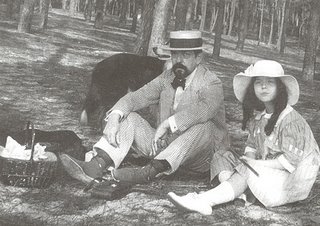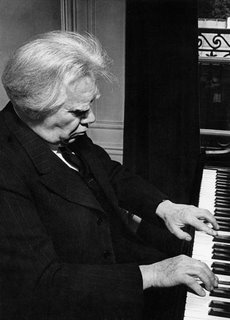
I happened upon the enchantment below after reading
Jessica Duchen's article in the Independent about the joys and hazards of YouTube.
I am so fond of Debussy's warm observance of the lives of children. I love the pieces that are musical mirrors of children's secret and open-hearted worlds. He captures essence of that sweet
quickness that moves them from universe to universe when they are deeply absorbed ... that quick and determined little dance they do that melts the heart with an admiring kind of love.
This little film captures the dance, too. It includes three of the pieces from the Children's Corner Suite, dedicated to Debussy's little daughter Claude-Emma (Chouchou). The dance is captured through a layering of great minds:
Emile Vuillermoz, music critic, biographer of Debussy and friend and student of Ravel. He wrote
Musiques d' Aujourd'hui (Music of Today, 1923),
Histoire de la Musique (History of Music: 1949),
Claude Debussy (1957), and
Gabriel Fauré (1960); filmmaker Marcel L'Herbier; pianist Alfred Cortot and Debussy. It's a recipe for intelligent magic.
Here it is.
Vuillermoz, by the way, was the kind of critic who could write this way: (here he's describing
the opening of Debussy's Prelude to the Afternoon of a Faun):
"The alternation of binary and ternary divisions of the eighth notes, the sly feints made by the three pauses, soften the phrase so much, render it so fluid, that it escapes all arithmetical rigors. It floats between heaven and earth like a Gregorian chant; it glides over signposts marking traditional divisions; it slips so furtively between various keys that it frees itself effortlessly from their grasp, and one must await the first appearance of a harmonic underpinning before the melody takes graceful leave of this causal atonality." (Emile Vuillermoz 1957)Debussy with his daughter Claude-Emma (Chouchou).
















